

Mandamientos del estudiante virtual. Jonathon Fletcher: forgotten father of the search engine. 3 September 2013Last updated at 19:01 ET By Joe Miller BBC News Until researchers tracked him down a few years ago, Jonathon Fletcher was not aware he had built the first modern search engine As Google celebrates its 15th birthday, the web giant has become a byword for information retrieval.

But if you put Jonathon Fletcher's name into a Google search, none of the immediate results hint to the role he played in the development of the world wide web. There is certainly nothing that credits him as the father of the modern search engine. Yet 20 years ago, in a computer lab at the University of Stirling in Scotland, Mr Fletcher invented the world's first web-crawling search engine - the very technology that powers Google, Bing, Yahoo and all the major search tools on the web today.
Solving search In 1993, the web was in its infancy. How to take a screenshot. MIT App Inventor. Cégep@distance / Trousse de recherche. Search. Convert RSS Feeds Into Any Format With xFruits. Recently, I stumbled across an impressive new service called [NO LONGER WORKS] xFruits. xFruits has a series of tools called “bricks” which serve a specific information-conversion service.
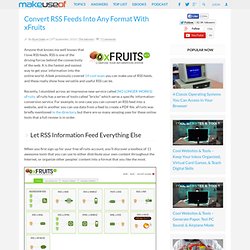
For example, in one case you can convert an RSS feed into a website, and in another you can use data from a feed to create a PDF file. xFruits was briefly mentioned in the directory, but there are so many amazing uses for these online tools that a full review is in order. Let RSS Information Feed Everything Else When you first sign up for your free xFruits account, you’ll discover a toolbox of 11 awesome tools that you can use to either distribute your own content throughout the Internet, or organize other peoples’ content into a format that you like the most.
So...You Wanna Make Your Own Books and Texbooks. For many teachers the traditional textbook just doesn't cut it any more.
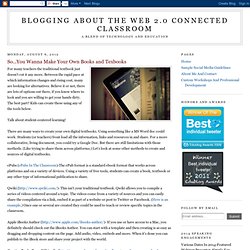
Between the rapid pace at which information changes and rising cost, many are looking for alternatives. Believe it or not, there are lots of options out there, if you know where to look and you are willing to get your hands dirty. SpellCheck.net - Free Online Spell Checker. 50 Indispensable EdTech Tools for 2012 - OnlineDegrees.org. Creating free apps, for free. Ubuntu. RubiStar: The rubric maker. Selecting a rating scale ubiStar offers two types of rating scales: numerical and descriptive. In numerical ratings, "four" signifies the highest level of achievement, whereas "one" signifies the lowest. Descriptive ratings, like the one chosen below, place the categories of excellent , good , satisfactory , and needs improvement in your rubric. Choosing categories.
Digital Skills. Browse Courseware. 12 Tools for Quickly Gathering Informal Feedback from Students. This morning I'm again facilitating a workshop with Greg Kulowiec.
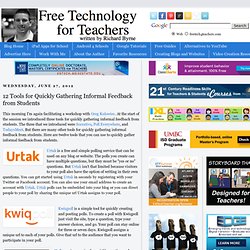
At the start of the session we introduced three tools for quickly gathering informal feedback from students. The three that we introduced were Socrative, Poll Everywhere, and TodaysMeet. But there are many other tools for quickly gathering informal feedback from students. Here are twelve tools that you can use to quickly gather informal feedback from students. Urtak is a free and simple polling service that can be used on any blog or website. Kwiqpoll is a simple tool for quickly creating and posting polls.
Hall.com is a service for quickly creating and hosting online collaboration spaces. Zite: Personalized Magazine for iPad and iPhone. What is Bitcoin? - We Use Coins. Gantt Chart History and Software. Turnitin: 10 types of unoriginal work #turnitin #edtech. How about this infographic from Turnitin to start the week?
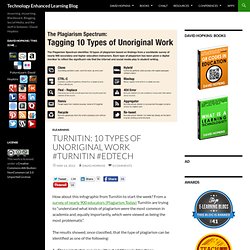
From a survey of nearly 900 educators (Plagiarism Today) Turnitin are trying to “understand what kinds of plagiarism were the most common in academia and, equally importantly, which were viewed as being the most problematic”. The results showed, once classified, that the type of plagiarism can be identified as one of the following: [Click to enlarge] The interesting points for me are the frequency results, with the ‘clone’ (direct copy, word for word) and the ‘mashup’ (mixed copies, multiple sources) coming out as the most frequent offences, whilst the clone and Ctrl-C (which are basically the same?)
Guided tour. Climbing the Bloom’s Ladder with HOT Web Apps. Apps and web apps are only as purposeful as the products and projects that they are used to create.
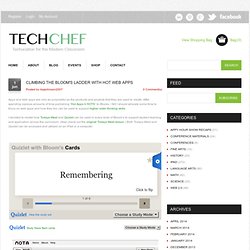
After spending copious amounts of time publishing “Hot Apps 4 HOTS” to iBooks, I felt I should allocate some time to focus on web apps and how they too can be used to support higher order thinking skills. I decided to model how Todays Meet and Quizlet can be used in every level of Bloom’s to support student learning and application across the curriculum. (Also check out the original Todays Meet lesson.) Both Todays Meet and Quizlet can be accessed and utilized on an iPad or a computer. Nota: Using Todays Meet Screenshots Today’s Meet & Quizlet: Further Resources: Tasked over the fall semester to review Web 2.0 tools, our team created a blog of 60+ Web 2.0 tools that includes a brief description of each and highlights a couple of ways each tool can be integrated into the classroom. Symbaloo of NEISD Reviewed Web 2.0 Tools. Edgalaxy.
Presentation Tools.